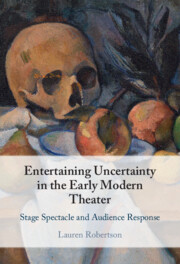Book contents
Chapter 3 - Props
from Part II - Playhouse Structure
Published online by Cambridge University Press: 02 February 2023
Summary
Chapter 3 treats the staging of tiny props in both the Globe and Blackfriars theaters. In Shakespeare’s Cymbeline and Antony and Cleopatra as well as Massinger’s The Picture, minuscule objects are deployed as metonymic evidence purporting to offer privileged, indubitable knowledge about a woman’s inscrutable body. The chapter demonstrates that the objects’ epistemological limitations, as detailed in the playtexts, became a phenomenological impasse in the playhouse. The very conditions of the props’ theatrical display in the large outdoor amphitheater and the small indoor hall would have variously exacerbated their narrative failures, undermining spectators’ attempts to see the objects clearly. At an historical moment when new empiricist methodologies promised to mitigate uncertainty, if not eradicate it entirely, the theater involved spectators in the failures of forensic investigation only to posit itself as a site for the capacious fulsomeness of spectacular display. The chapter ultimately argues that the very ephemerality of theatrical spectacle becomes, in all three plays, the alternative to the permanence of partial knowledge.
Information
- Type
- Chapter
- Information
- Entertaining Uncertainty in the Early Modern TheaterStage Spectacle and Audience Response, pp. 113 - 147Publisher: Cambridge University PressPrint publication year: 2023
